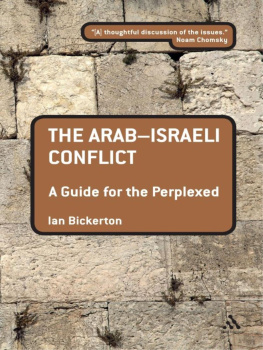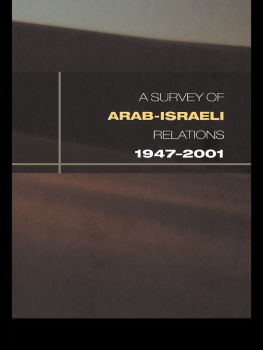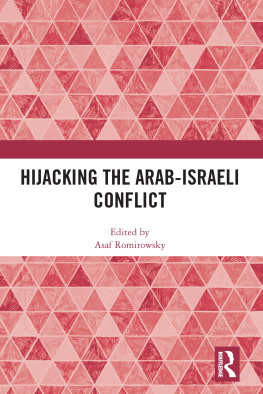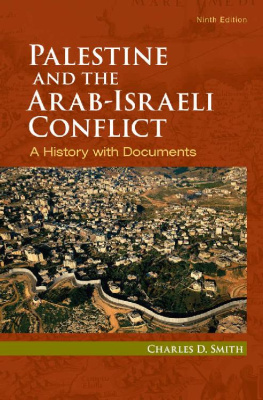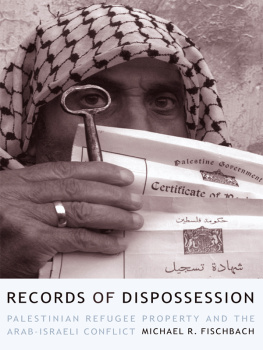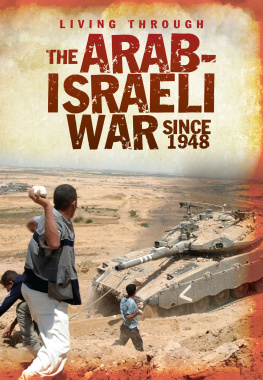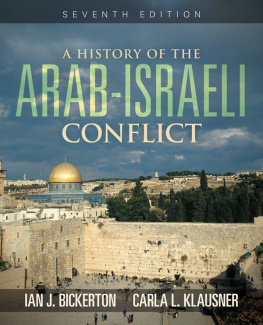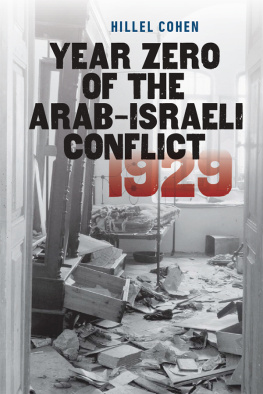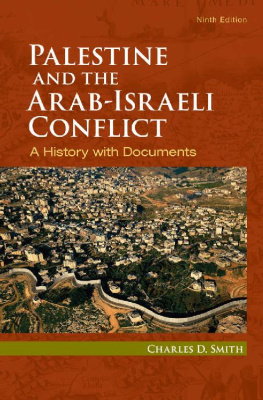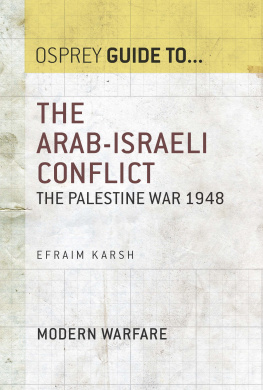2012
Continuum International Publishing Group
80 Maiden Lane, New York, NY 10038
The Tower Building, 11 York Road, London SE1 7NX
www.continuumbooks.com
by Ian J. Bickerton, 2012
All rights reserved. No part of this book may be reproduced, stored in a retrieval system, or transmitted, in any form or by any means, electronic, mechanical, photocopying, recording, or otherwise, without the written permission of the publishers.
Library of Congress Cataloging-in-Publication Data
A catalog record for this book is available from the Library of Congress.
ISBN 978-1-4411-5417-0
ACKNOWLEDGEMENTS
I could not have written this book without the contributions of my students, colleagues and mentors who have generously shared their views on the ArabIsraeli conflict over a number of years. I trust they recognize their contribution, even if they do not agree with all my conclusions. I should like to thank the many individuals who generously gave their time to explain to me their views on, and experiences of, the conflict during my time in the Middle East in 2010. I should especially like to thank Lisa Arnold for her invaluable assistance during that visit. I should also like to thank the UNSW Faculty of Arts and Social Sciences for the small grant that helped meet my travel costs. I would also like to acknowledge Kenneth Hagan, Bruce Clunies-Ross, Dominic Kelly, Ruth Wilson and Jim Levy who listened to my ramblings and offered constructive advice. I thank Jennifer Ng and Justine Saidman for their efficient research assistance. My colleague Joseph Siracusa read the manuscript and did all he could to save me from many errors of substance and style. However, no one but myself should be held responsible for any shortcomings the reader may find in the work.
I take pleasure in thanking Marie-Claire Antoine at Continuum Books for her encouraGEMENt and support at every stage of this book. Thanks also to Srikanth, Project Manager at Newgen, and his team for their professionalism in the production of the book. Finally, I thank Jenny who accompanied me to the Middle East for her wise counsel, and for cheerfully giving a great deal of her time and energy to accommodate my demands while writing.
PREFACE
What the world really knows about itself it
doesnt dare say.
John LeCarre, Our Kind of Traitor
This book did not turn out as I expected. Three things changed what I wanted to say. The first was my visit to the Middle East in the fall of 2010. The second was the startling revelations of previously secret documents published by Al-Jazeera and the Guardian newspaper, quickly dubbed the Palestine Papers, in January 2011. And the third was the popular uprisings that unexpectedly erupted in the Middle East, reverberating through the regions dynastic and despotic regimes transforming the Arab world.
Like most who write/comment on the ArabIsraeli conflict, I rely upon media reports and images and the statements of political leaders, as well as scholarly studies, to describe and explain the actions of those involved in the conflict. I have written about the conflict and taught it at university level for more than 30 years and initially I intended to rely primarily on Western and Israeli sources (in English) in presenting the arguments and supporting evidence of the belligerents, not because I believed they were necessarily more accurate than Arab accounts and sources, but because I thought they would be more familiar and credible to readers.
However, my very sensible wife, Jennifer Catherine, quietly intimated that I could not possibly write a book on the subject without once again visiting the region. I had not been to Israel for more than ten years and I had never visited Lebanon, Syria, Jordan or Egypt at all. So we went on a four-week journey travelling independently through the first three above-named Arab countries, Israel and the West Bank, and stayed overnight in the Gaza Strip.
The journey was a revelation, especially seeing first-hand the physical landscape and features of the region. I grew up on the edge of the great Australian desert, the Nullabor Plain, so I know about deserts, but I was not prepared for the harsh living conditions and the extent of inhospitable landscape that makes up much of Syria and Jordan. I also saw the great pride the peoples of the region have in their classical past and how past traditions remain an important part of their rapidly changing present day. During our journey, we spoke to United Nations Relief and Works Agency (UNRWA) officials, government officials (including the Palestinian Authority), Palestinian refugees, intellectuals (academics and school-teachers), journalists, non-government organization (NGO) workers, taxi drivers, persons in the street and regular families. We did not speak to religious leaders or elected representatives in any country they speak out often enough for their (at least public) views to be well known. At no time did we experience any concern for our personal safety; indeed the warmth with which we were greeted and the hospitality shown to us by everyone we met in the Arab states and in Israel was quite extraordinary. At all border crossings we were processed efficiently and treated with courtesy and respect.
Of course, the views I formed during my travels are impressionistic and idiosyncratic, and I make no claim to be a learned scholar of the history, culture, politics and social mores of the Middle East on the basis of a months visit. But how many Israeli commentators or experts on the ArabIsraeli conflict have spent time in Lebanon or Syria or the Gaza Strip in recent years or even Jordan for that matter apart from being in the army, of course? Who do they rely upon for their information about these places? Have they personally seen the locations they write of, or spoken to the person in the street, for example, to elucidate their views? And how many Arab commentators have seen for themselves life in Israel including the lives of Arab citizens of Israel? Not many on either side as far as I can tell.
Although I spent only a short time in the region, certain realities became immediately more apparent, and an awareness of them is essential if you wish to gain any balanced, realistic understanding of the ArabIsraeli conflict. Balance on this topic is almost impossible as it raises visceral responses on both sides. The first reality to grasp is the degree to which Israel is by far the most powerful country militarily and economically in the immediate region. The ruling families of Saudi Arabia and the Gulf sheikdoms may have more wealth than the wealthiest Israelis , but none of the Arab states bordering Israel or within hundreds of miles of it come within coo-ee of providing their populations with a standard of living equal to that of Israelis or of matching Israels military power. That is why I have included an Appendix showing the various indicators that make clear the huge disparity in Israels favour between Israel and its neighbours. It is a long time since Israel was a Jewish David surrounded by Arab Goliaths if indeed that was ever the case.

